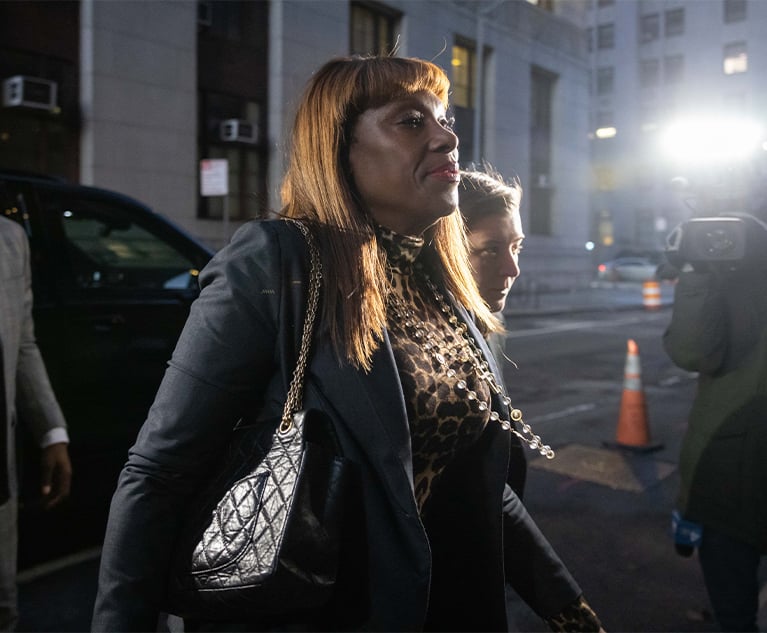Federal Judge Opens the Door to CFTC to Regulate Virtual Currency
U.S. District Senior Judge Jack B. Weinstein of the Eastern District of New York issued the opinion granting standing to the Commodity Futures Trading Commission to exercise its enforcement power over virtual currency fraud.
March 06, 2018 at 06:33 PM
3 minute read

A federal judge issued a 79-page order Tuesday establishing regulatory authority over virtual currency.
U.S. District Senior Judge Jack B. Weinstein of the Eastern District of New York issued the opinion granting standing to the Commodity Futures Trading Commission to exercise its enforcement power over virtual currency fraud.
The judge held that the Commodity Futures Trading Commission can regulate virtual currency as a commodity and exercise its jurisdiction over fraud that does not directly involve the sale of futures or derivative contracts.
Weinstein also issued a preliminary injunction in the commission's favor in a case against Cabbage Tech Corp., doing business as Coin Drop Markets, and Patrick K. McDonnell of Staten Island.
The CFTC sued McDonnell and his company, Coin Drop Markets, alleging operation of “a deceptive and fraudulent virtual currency scheme … for purported virtual currency trading advice” and “for virtual currency purchases and trading,” Weinstein said.
“Until Congress clarifies the matter, the CFTC has concurrent authority, along with other state and federal administrative agencies, and civil and criminal courts, over dealings in virtual currency,” Weinstein said. “An important nationally and internationally traded commodity, virtual currency is tendered for payment for debts, although, unlike United States currency, it is not legal tender that must be accepted.”
The litigation raised the issue of whether the CFTC has standing to sue defendants for alleged violations of the Commodity Exchange Act.
“Presented are two questions that determine the plaintiff's standing: (1) whether virtual currency may be regulated by the CFTC as a commodity; and (2) whether the amendments to the CEA under the Dodd-Frank Act permit the CFTC to exercise its jurisdiction over fraud that does not directly involve the sale of futures or derivative contracts,” Weinstein said. “Both questions are answered in the affirmative. A 'commodity' encompasses virtual currency both in economic function and in the language of the statute.”
Weinstein said the commission's broad authority “extends to fraud or manipulation in derivatives markets and underlying spot markets.” He also said the commission “may exercise its enforcement power over fraud related to virtual currencies sold in interstate commerce.”
David William Oakland of the CFTC served as lead counsel for the commission. He could not be reached immediately for comment.
McDonnell represented himself. “I'm not at liberty to discuss the case while it's pending,” he said Tuesday.
The judge included in the order as an appendix the written testimony of CFTC chairman J. Christopher Giancarlo before the U.S. Senate Banking Committee on Feb. 6 in Washington.
“Emerging financial technologies broadly are taking us into a new chapter of economic history. They are impacting trading, markets and the entire financial landscape with far-ranging implications for capital formation and risk transfer,” he said. “We are entering a new digital era in world financial markets. As we saw with the development of the internet, we cannot put the technology genie back in the bottle. Virtual currencies mark a paradigm shift in how we think about payments, traditional financial processes, and engaging in economic activity. Ignoring these developments will not make them go away, nor is it a responsible regulatory response.”
This content has been archived. It is available through our partners, LexisNexis® and Bloomberg Law.
To view this content, please continue to their sites.
Not a Lexis Subscriber?
Subscribe Now
Not a Bloomberg Law Subscriber?
Subscribe Now
NOT FOR REPRINT
© 2024 ALM Global, LLC, All Rights Reserved. Request academic re-use from www.copyright.com. All other uses, submit a request to [email protected]. For more information visit Asset & Logo Licensing.
You Might Like
View All
Attorneys 'On the Move': Structured Finance Attorney Joins Hunton Andrews Kurth; Foley Adds IP Partner
4 minute read

NY Civil Liberties Legal Director Stepping Down After Lengthy Tenure

Former Top Aide to NYC Mayor Is Charged With Bribery Conspiracy
Trending Stories
- 1Call for Nominations: Elite Trial Lawyers 2025
- 2Senate Judiciary Dems Release Report on Supreme Court Ethics
- 3Senate Confirms Last 2 of Biden's California Judicial Nominees
- 4Morrison & Foerster Doles Out Year-End and Special Bonuses, Raises Base Compensation for Associates
- 5Tom Girardi to Surrender to Federal Authorities on Jan. 7
Who Got The Work
Michael G. Bongiorno, Andrew Scott Dulberg and Elizabeth E. Driscoll from Wilmer Cutler Pickering Hale and Dorr have stepped in to represent Symbotic Inc., an A.I.-enabled technology platform that focuses on increasing supply chain efficiency, and other defendants in a pending shareholder derivative lawsuit. The case, filed Oct. 2 in Massachusetts District Court by the Brown Law Firm on behalf of Stephen Austen, accuses certain officers and directors of misleading investors in regard to Symbotic's potential for margin growth by failing to disclose that the company was not equipped to timely deploy its systems or manage expenses through project delays. The case, assigned to U.S. District Judge Nathaniel M. Gorton, is 1:24-cv-12522, Austen v. Cohen et al.
Who Got The Work
Edmund Polubinski and Marie Killmond of Davis Polk & Wardwell have entered appearances for data platform software development company MongoDB and other defendants in a pending shareholder derivative lawsuit. The action, filed Oct. 7 in New York Southern District Court by the Brown Law Firm, accuses the company's directors and/or officers of falsely expressing confidence in the company’s restructuring of its sales incentive plan and downplaying the severity of decreases in its upfront commitments. The case is 1:24-cv-07594, Roy v. Ittycheria et al.
Who Got The Work
Amy O. Bruchs and Kurt F. Ellison of Michael Best & Friedrich have entered appearances for Epic Systems Corp. in a pending employment discrimination lawsuit. The suit was filed Sept. 7 in Wisconsin Western District Court by Levine Eisberner LLC and Siri & Glimstad on behalf of a project manager who claims that he was wrongfully terminated after applying for a religious exemption to the defendant's COVID-19 vaccine mandate. The case, assigned to U.S. Magistrate Judge Anita Marie Boor, is 3:24-cv-00630, Secker, Nathan v. Epic Systems Corporation.
Who Got The Work
David X. Sullivan, Thomas J. Finn and Gregory A. Hall from McCarter & English have entered appearances for Sunrun Installation Services in a pending civil rights lawsuit. The complaint was filed Sept. 4 in Connecticut District Court by attorney Robert M. Berke on behalf of former employee George Edward Steins, who was arrested and charged with employing an unregistered home improvement salesperson. The complaint alleges that had Sunrun informed the Connecticut Department of Consumer Protection that the plaintiff's employment had ended in 2017 and that he no longer held Sunrun's home improvement contractor license, he would not have been hit with charges, which were dismissed in May 2024. The case, assigned to U.S. District Judge Jeffrey A. Meyer, is 3:24-cv-01423, Steins v. Sunrun, Inc. et al.
Who Got The Work
Greenberg Traurig shareholder Joshua L. Raskin has entered an appearance for boohoo.com UK Ltd. in a pending patent infringement lawsuit. The suit, filed Sept. 3 in Texas Eastern District Court by Rozier Hardt McDonough on behalf of Alto Dynamics, asserts five patents related to an online shopping platform. The case, assigned to U.S. District Judge Rodney Gilstrap, is 2:24-cv-00719, Alto Dynamics, LLC v. boohoo.com UK Limited.
Featured Firms
Law Offices of Gary Martin Hays & Associates, P.C.
(470) 294-1674
Law Offices of Mark E. Salomone
(857) 444-6468
Smith & Hassler
(713) 739-1250






